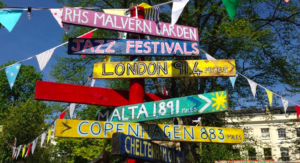 This new work has just been published online in the International Journal of Heritage Studies, it will also be available soon in a special issue of the journal I am co-editing with Prof Tony Whyton, that features research on heritage and (jazz) festivals from recently-ended EU-funded CHIME project.
This new work has just been published online in the International Journal of Heritage Studies, it will also be available soon in a special issue of the journal I am co-editing with Prof Tony Whyton, that features research on heritage and (jazz) festivals from recently-ended EU-funded CHIME project.
Download a free copy of my article via this link: The heritage of slavery in British jazz festivals. And here is the abstract, that tells about the contents… I hope you find it of interest. Festival directors: do let me know what you change.
This article explores site-specific heritage questions of the contemporary cultural practice of festivals of jazz – a key transatlantic music form – by bringing together three areas for discussion and development: questions of slavery heritage and legacy; the location, built environment and (touristic) offer of the historic city; and the contemporary British jazz festival, its programme and the senses or silences of (historical) situatedness in the festival package. Other artistic forms, cultural practices and festivals are involved in self-reflexive efforts to confront their own pasts; such are discussed as varying processes of the decolonisation of knowledge and culture. This provides the critical and cultural context for consideration of the jazz festival in the Georgian urban centre. Preliminary analysis of relevant jazz festivals’ programmes, commissions and concerts leads to interrogating the relationship – of silence, of place – between jazz in Britain, historic or heritage locations and venues, and the degree or lack of understanding of the transatlantic slave trade. The heritage centres clearly associated with the slave trade that also have significant (jazz) festivals referred to include Bristol, Cheltenham, Edinburgh, Glasgow, Hull, Lancaster, Liverpool, London, and Manchester.

